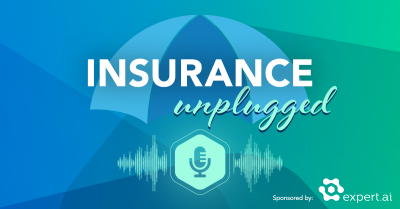
The intersection of artificial intelligence and insurance poses critical questions for insurers looking to solve tangible challenges with new technologies. Where should we be directing our focus, and where can the latest AI technologies add the most value?
For James Benham, the true power of AI lies in its ability to tackle the basic, repetitive tasks that clutter our workflows.
James recently joined Lisa Wardlaw on a recent episode of the Insurance Unplugged podcast to talk about the real-world value and opportunity that AI brings to insurance processes.
James Benham is an entrepreneur, author and podcast host and CEO and Co-Founder of JBKnowledge, a multinational technology and consulting company that develops industry-leading software for top insurance companies around the world.
Here is an excerpt of their conversation on Insurance Unplugged.
Lisa Wardlaw: What are you thinking is the over indexing versus what is the direction that you think people in the industry should be going? Where should we be adding value with AI?
James Benham: We’ve got to look at some of the more basic, boring tasks first. We all have shiny object syndrome. AI is not going to eat the world. It’s definitely going to change work. I write far less, and we as a company write far less software now than we did years ago. Sheer lines of code. There’s going to be a big shift in what people do and the minutia we engage in. Things like ChatGPT are remarkably good at doing the boring, menial stuff.
But I really think we need to turn our eyes to the adjuster’s desk because the market often sets the rate. We determine loss ratios with how well we manage claims. I think there’s not enough attention on how to really manage those claims. There’s some amazing technology.
LW: How do we attack the loss ratio without being so fraught with point solutions that don’t work together?
JB: Well, this was a problem that still plagues the construction industry as well as the insurance industry and almost any other industry I look at in the startup world. It’s hard to raise enough money to go after building a new core system in any industry. it’s just a big ask. It’s a lot to go after.
The only way it works is if we can integrate it into the rest of our enterprise. We use point solutions, but sparingly. It’s not reasonable to think that everyone should have 50,000 point solutions. That being said, the opposite side of this is that modifying core systems is extremely expensive and sometimes not worth it when you’re rolling out a new line at a carrier and you don’t know if it’s going to work.
For certain applications, point solutions are really effective. And for certain applications, low-code solutions can help you deploy things until you see if they’re going to work. But they need to be baked into the core system.
LW: How do insurance carriers and solution providers need to be thinking about AI strategy? By strategy, I mean architectural strategy, foundational strategy, etc. We can talk specifically about LLMs and how we think that’s going to help insurance. I think that’s actually the most powerful. We are a linguistic industry.
JB: The whole industry is contracts and documents. And the industry mitigates risk through documents. We produce documents and LLMs are the consumption of documents and information. It’s a great fit. Large language models are a phenomenal fit.
I think that AI has some massive potential in this space now.
One of the keys to socializing mobile technology was getting a really good mobile device in everybody’s hands when you can really push the consumerization of an enterprise technology.
Blackberry was an enterprise grade technology that never really made the leap into the consumer realm. They tried to and failed, and then Apple and Android came along around the same time and just clobbered the whole market with an enterprise tool that really went consumer first and then went back to the enterprise, right? That’s kind of what happened.
I think the same thing’s happening with AI where ChatGPT is in everybody’s hands now, over a hundred million people. In the first 60 days, it was the fastest adoption of any technology tool in human history, which is bizarre. So, people are now getting used to this technology set that can radically change how you consume information and how you generate information, which is amazing.
Now, the challenge for us in insurance is it’s a bit of a black box where we don’t understand exactly how it produces its results.You’re starting to see some LLM providers give you citations, references and some information on how it arrived at its conclusions. So, it can help us understand what’s going on.
I’m the most excited about that. And some of the really good machine learning models that have been trained on insurance data now are getting much better at predicting outcomes, much better at recommending treatments for injured workers much better because they’re now consuming 50 million claims, they’re now consuming 30 million policies. You have enough data consumed that it can train and get much better at helping us make good decisions.
LW: To your point on loss ratio, how can we then use that to drive better prevention, better care and help us actually serve the consumer? How do you think that LLMs are kind of the anchor and how are you looking to leverage those with your business customers?
JB: LLMs allow us to analyze so much more information so quickly. It allows us to upload and synthesize documents. I mean, I did a really interesting project last week where I took seven RFPs and smashed ’em up and analyzed all the common requirements. It took 30 seconds to read 2,000 pages of RFPs and pull the requirements out.
It allows us to consume a lot more information a lot faster. It allows us to generate content a lot quicker. It will definitely help from a customer service perspective. I think we drastically underestimate how important communication is in the claims process. For example, the tone of the initial letter you send to the claimant can radically dictate whether they work with you amicably or go hire a lawyer. The generation of communications is an area where we can really see a massive improvement.
Text summarization is also something that the current generation of AI products can do really well.
LW: What’s the one thing that you would ask everyone to stop doing when it comes to AI and insurance?
JB: Well, I wish they would stop saying or assuming that AI is going to eliminate jobs, net aggregate jobs like any other technology. It’s going to force people to change how they do what they do or maybe slightly change what they do.
We’re sitting at the lowest unemployment rate in recorded human history. I would just say, please look at the data before you say that all jobs are gone, all work is gone. Because I think work is just going to continue to radically change and people will have jobs. If people don’t want to retrain and don’t want to learn new things, then yes, they might have a hard time. You might not be able to do exactly what you do forever, but you can work. And the likelihood is your wages are going to go up and your vacation’s going to go up.
Start looking at the more boring applications of this technology that have a huge impact on the day-to-day, like we just talked about, letters and note summarization, basic stuff that can have a massive impact on what now, you don’t necessarily have to replace your core system to get that either. And then you also have to take a really hard eye whenever you get a technology: what’s your integration strategy? How are you going to get all this data to tie together and work together? Does everybody play well in the sandbox or do they have a giant walled garden? I think that’s something that’s super important as well. If you just did a really quick start, stop exercise, that’d be my stop and my start and then continue doing well, challenge everything, continue challenging everything.
LW: What’s your final call to action for the industry?
JB: Be a learner and a teacher.
First off, welcome people who aren’t in the insurance industry. Then, be willing to teach them everything you know, without judgment, and assume that they have something really cool to bring to our sector.


